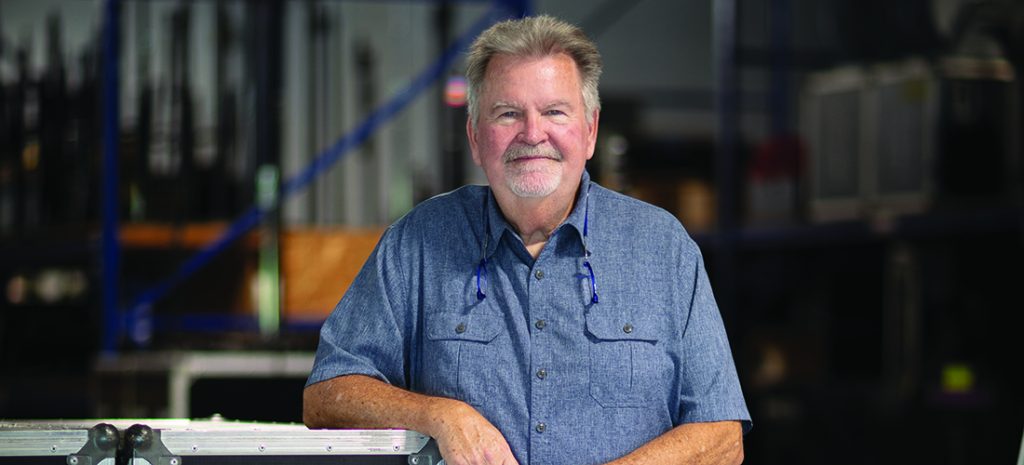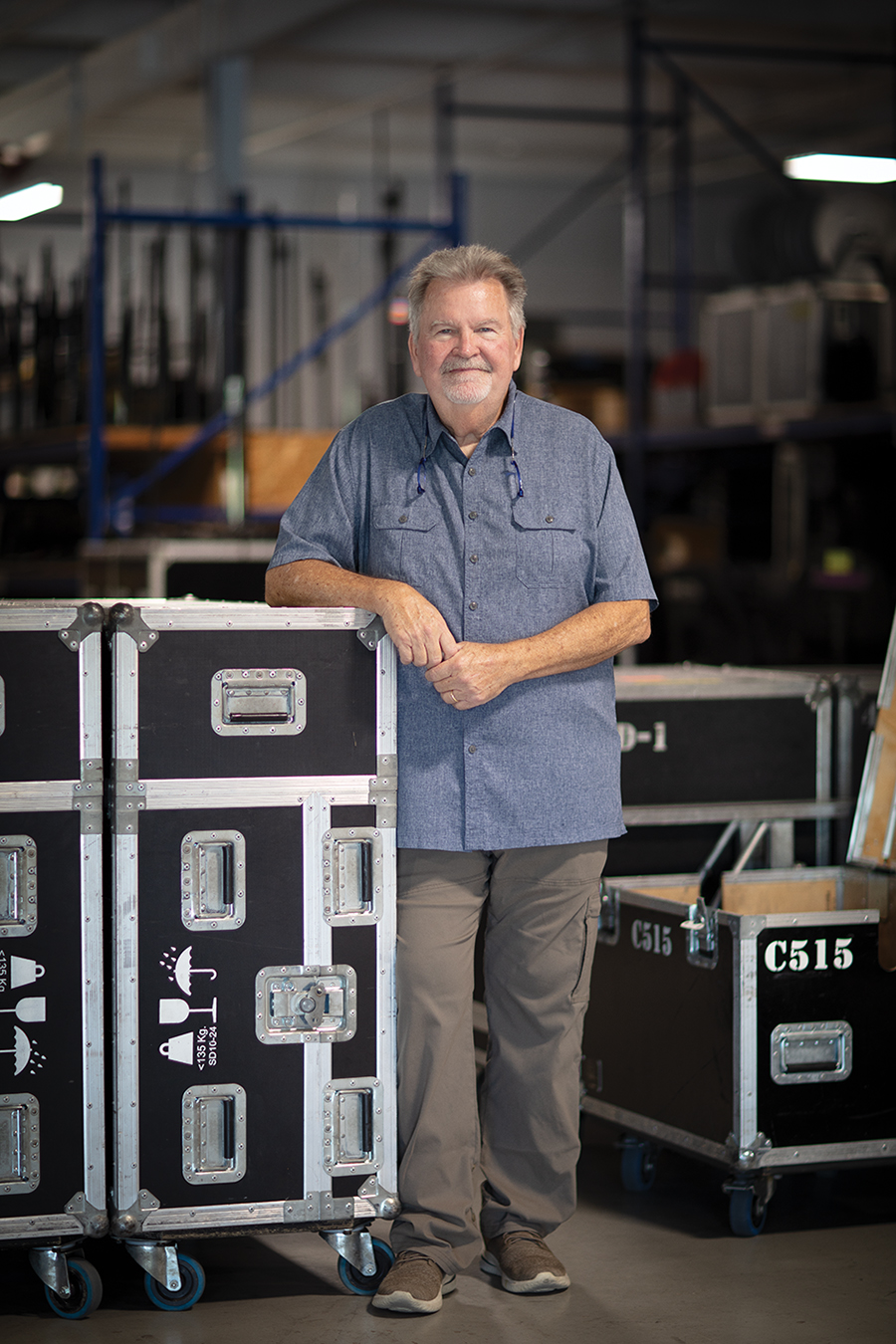The Engineer of Sound

From MerleFest to Tanger, over the last 50 years Cliff Miller has done it all
By Ogi Overman
Photograph by Mark Wagoner
 The early ’70s were a fertile time for bluegrass festivals and fiddlers’ conventions. Spurred by the success of Union Grove and Camp Springs, a new festival sprang up in 1973 in the small community of Angier, 20 miles south of Raleigh. For a startup, it featured an impressive lineup, including a blind guitarist from Deep Gap named Doc Watson. By then, Watson was already a revered figure among music aficionados, if not quite yet a household name.
The early ’70s were a fertile time for bluegrass festivals and fiddlers’ conventions. Spurred by the success of Union Grove and Camp Springs, a new festival sprang up in 1973 in the small community of Angier, 20 miles south of Raleigh. For a startup, it featured an impressive lineup, including a blind guitarist from Deep Gap named Doc Watson. By then, Watson was already a revered figure among music aficionados, if not quite yet a household name.
Running sound for the multistage event was 21-year-old whiz kid Cliff Miller from Asheboro. Even at that young age, Miller had amassed credentials not only as a top-notch sound tech, but as a guitarist/vocalist, repairman, speaker-cabinet builder and innovator of all things having to do with sound reinforcement. During Doc and son Merle’s set, Miller says Doc called out, “Sounds like you’re having a little trouble around 160, son.” That’s musician speak, Miller explains, for his inability to modulate the sound patterns at 160 hertz between the D and G string of Doc’s guitar.
Miller’s response? “So afterward, I went backstage and asked him some questions about resonance and frequencies, and I guess he was impressed that I wanted to learn and wanted to get it right. He seemed to like me, I think.”
Thus was born a relationship that lasted until Doc’s death on May 29, 2012. Miller played alongside the father and son (plus bassist T. Michael Coleman) until Merle’s untimely death in a tractor accident in 1985. He also ran sound for Doc (and anyone who was accompanying him) too many times to count, and, when a festival was conceived at Wilkes Community College in 1988 to honor Merle’s memory, it was Miller who was the driving force behind it. Today, 35 festivals, hundreds of artists and millions of fans later, Miller and his company, SE Systems, are still responsible for every aspect of sound reinforcement at all 13 stages of what is now MerleFest.
But, whether meeting Watson years earlier was kismet or coincidence, Miller would, no doubt, have gone on to an illustrious career due to his own ingenuity, work ethic, talent, good nature and engaging personality.
Former bandmate and lifelong friend T. Michael Coleman says, “He was always the calming voice in the storm, never myopic, always humble and dependable.”
Or as Miller, now 71, self-effacingly says, “I just had a knack for it. Plus, I just liked being around musicians and tinkering with equipment.” Maybe, but Coleman adds, “It’s not what you do but who you are that matters, and Cliff exemplifies that.”
That “knack” began around age 10 when an uncle gave him a Maybelle acoustic guitar. Then, at 14, his parents gifted him an electric guitar for Christmas. “It was Fender Mustang, white with a red pick guard and a Princeton Reverb amp.”
So, he did what every other kid in America at the time did — he started a “combo,” first the Crusaders and then the Chamois. At 16, he managed to take out a loan to buy one of the hot, new Kustom PA systems, whose exteriors were “upholstered” in rolled-and-pleated naugahyde, just like the seats in a hot rod. “That PA became the fifth member of the band,” he says.
Meanwhile, multitasker that Miller is, he and his father converted an old hosiery mill that his dad owned into a workshop, where he learned welding, woodworking and electronics, and began doing repair work. He also went to work at a local radio station, WGRW, earning his third-, second- and first-class radio and telephone license from Elkin Institute in Atlanta. Moreover, right out of high school, he became the service manager at Jerry C. Rowe Music, where he learned how to repair Leslie cabinets, Hammond organs, Fender amps and whatever else was broken. Not long afterward, the store closed, and Miller decided it was time to start his own business, founding Sound Engineering. His first concert under that name was August 21, 1973 — a date he considers his business’s official anniversary — 50 years ago!
“We were doing shows as well as a lot of speaker re-coning and started getting some business from big bands like Chairmen of the Board and Nantucket, as well as well-known local bands like Brice Street,” he recalls. He’d also added a sales component, becoming an Ampeg amp, Hohner harmonica and Moog synthesizer dealer. Soon he hired guitar collector and salesman J.R. Luther to head up the department. Luther, by the way, is still with the Miller organization some 40 years later. His office walls are covered with at least 50 guitars, each with its own story, not counting the hundreds he has stored in his basement.
As he outgrew one building, and then another, Miller opted to move his operation from Asheboro to Greensboro in 1992. Again he ran out of space twice. As fate would have it, a commercial real estate agent named Tom Townes — who is the brother of “B” Townes, MerleFest’s first general manager — showed him a 57,300 square-foot building on Phoenix Drive, which, after a year of renovation, became SE Systems’ permanent home.
“We’re a three-pronged operation — sales, production and installation — and we have another sales office in Charlotte,” he says.
While his half-century body of work is too vast to elucidate here, a sampling would include:
- His first ever arena show at the 1987 U.S. Olympic Festival in Carter-Finley Stadium
- 10 MLB All-Star games
- Audio director for the Carolina Panthers stadium
- The Lexington BBQ Festival, where he ran sound and got to know an up-and-coming artist named Taylor Swift
- Stevens Center shows with Tony Bennett, Dinah Shore, Josh Groban and many renowned stars
- A concert at the White House with Bill Monroe and Doc Watson, where he met President Jimmy Carter (a letter signed “Jimmy” hangs in the lobby of his facility)
- Playing with Doc, Merle and T. Michael Coleman on Austin City Limits
“We went out to San Francisco for the awards with pretty much no chance of winning,” notes Miller, “since our competition was the Rolling Stones, James Taylor and Dave Matthews. Needless to say, it was quite a shock and honor.”
His most recent — and perhaps most challenging — achievement was working alongside the guru of all sound reinforcement, John Meyer, installing the sound system for the Greensboro’s Tanger Center.
“There are 254 speakers every six to eight feet in the walls, ceiling, over the stage and balcony, each with its own enclosure,” explains Miller. That lets sound engineers change the acoustics of the room depending on conditions.
Greensboro Coliseum managing director Matt Brown, who made the decision to hire Miller for the critical Tanger project, is 100 percent certain he got the right man for the job.
“I have the highest regard for Cliff,” says Brown, who has leaned on Miller’s expertise at the Coliseum’s many venues. The performance of the Meyer Constellation system Miller recommended, says Brown, “shows how truly fortunate we are to have such a talented sound engineer in our community.”
Lest one think that Miller’s life has been one of accolades, awards and befriending hundreds of stars in and beyond the bluegrass community, think again. In November 2016, he underwent a successful kidney transplant, receiving an organ donated by well-known local Realtor Kathy Haynes. Shortly after he was back on his feet, the pandemic hit and the entire entertainment world went dark.
“It was a hard spot for us,” he laments. “Life as we knew it, producing shows, stopped dead. We didn’t do a thing for an entire year. I think it made people realize that we are not a business, but an industry.”
Whether it’s a business or an industry, Miller is the same, self-effacing, hard-working individual who’s managed to be a perfectionist without being a jerk. As longtime friend and employee Bob Thornley says, “He’s the best guy I’ve ever worked for — and I’ve worked for a lot.” OH
Ogi Overman has been a familiar face on the central Carolina alternative and community journalism scene for almost 40 years. He has edited six publications and served as a columnist, reporter and feature writer. He is currently compiling his columns for a book to be titled A Doughnut and a Dream.
